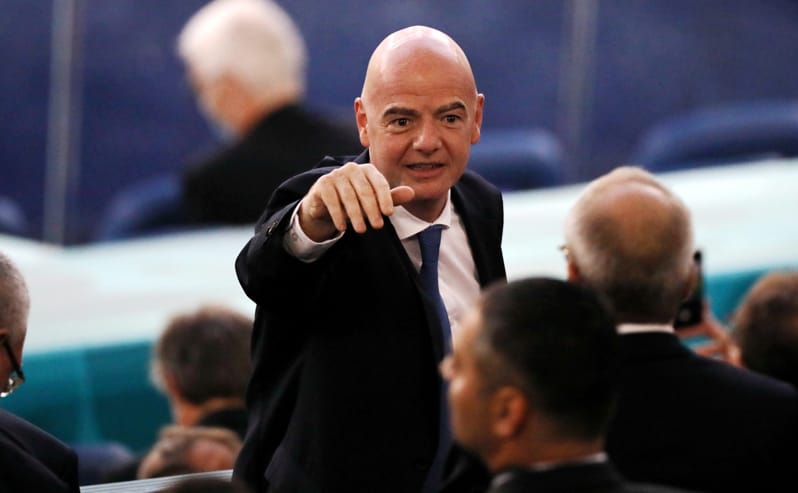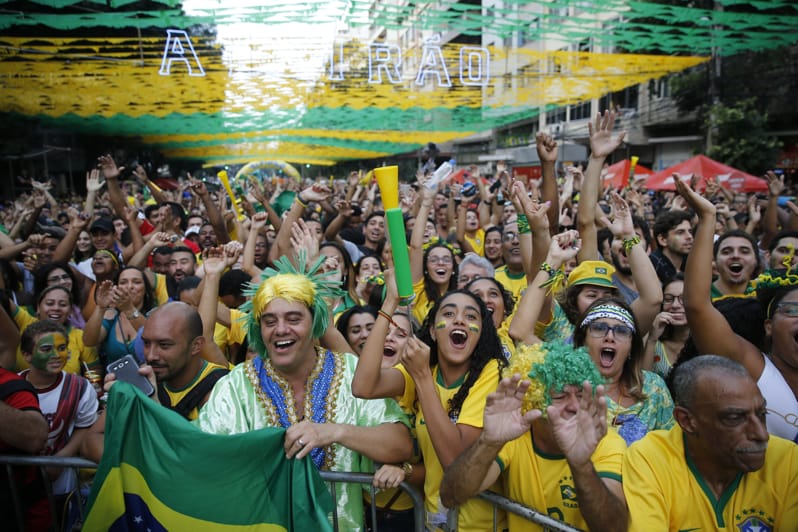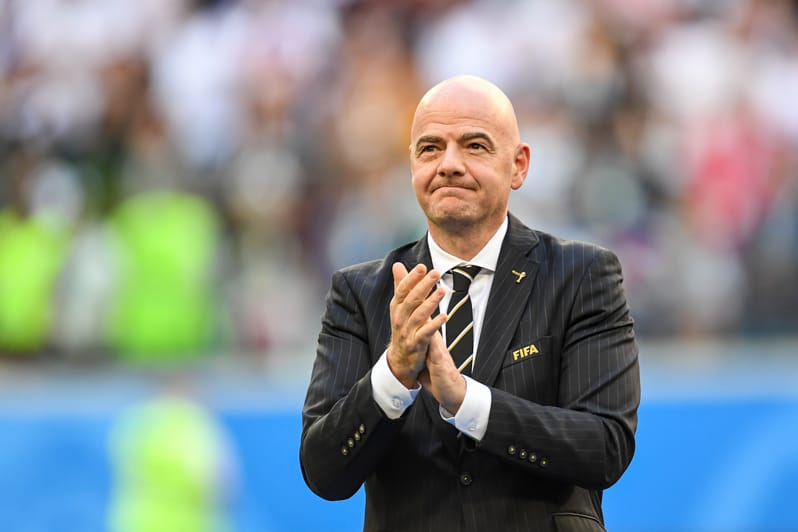Photo credit: Asatur Yesayants/Shutterstock
For a long time, football fans had indifferent feelings towards Gianni Infantino. His main redeeming quality being that he wasn’t Sepp Blatter, the FIFA President who had presided over institutional corruption for the best part of two decades.
However, that has all changed. After a month of tone-deaf speeches, and hare-brained scheming — Infantino is now as popular with football fans as an undercooked half-time pie. With Infantino in the spotlight we wanted to take a look at the leadership errors he has made, and how and why you should look to avoid them.
A Lack of Self-Awareness
This World Cup started in dramatic fashion even before a ball had been kicked. The pre-tournament President’s address is typically a formality. Banal phrase follows banal phrase as the President explains why this World Cup, more than any other World Cup will be the best yet. But, this time, Infantino had other ideas.
Clearly ticking after weeks of negative coverage relating to Qatar’s laws on human rights, Infantino launched a proverbial two-footer on the critics of the regime and his own organisation.
He began his speech in bizarre fashion declaring:
“Today I feel Qatari. Today I feel Arab. Today I feel gay. Today I feel disabled.”
The FIFA President went on to state that he felt the same as these often oppressed groups, as he too had faced discrimination for having ginger hair and freckles.
Other highlights of his near hour-long ramble included accusing the west of hypocrisy for their historic role in the slave trade, and a suggestion that North Korea could be a future World Cup host.
What Infantino’s speech typified was a clear lack of self-awareness. In the manner of his delivery it appears that he believed he was saying something genuinely profound. Words that would sway the doubters. That this was his ‘I have a dream’ moment.
In contrast, it was anything but. There have been reports of hundreds if not thousands of workers dying in Qatar due to the inhospitable working conditions. Wives losing loved ones, and children growing up without fathers. For him to sit there in a designer suit, and to compare his own travails to this monumental level of suffering, made him look not just foolish, but uncaring and ill-informed.
His barbs directed at European journalists, effectively calling for them to cease negative reporting due to their homeland’s own historical misdemeanours, showed again his distance from reality. Rather than soothing tensions, he amplified them. His combative approach heightening the ire felt by the press pack towards him.
What We Can Learn From This
The flaws in Infantino’s speech offers a lesson for us all. When making a speech, particularly one that might ruffle a few feathers, it is vital to have watertight arguments. To ensure that what you are saying has been properly researched, is not affected by unconscious biases, and perhaps most importantly that you are not blinded by your own loyalty to a particular process or project.
Infantino’s desperation to defend Qatar at any cost has led him down a path in which his statements lack objectivity, and can often be considered as callous towards the people suffering at the hands of the regime.
Another lesson to learn is to pick your battles. Infantino was never going to be able to persuade the journalists sitting in front of him by attacking them. And by doing so he heightened the scrutiny that he faced. Infantino’s poor leadership of FIFA became a running narrative throughout the World Cup — one that he could have avoided was not so antagonistic during his opening address.
Perennially Making Himself the Centre of Attention
Throughout the early stages of the tournament, a new World Cup tradition emerged. At some point throughout each match, in between tackles and passes, an image would be beamed on the big screen of the FIFA President presiding over the action. Infantino looking down from above, secluded on a throne-like chair. And looking quite bored in the process.
A minor detail certainly, but a telling one. The repetitive nature of this diversion, the need to deflect everyone’s attention to the fact that, don’t panic, Gianni is in the building. It was an attempt to further his reputation. To show that all the majestic displays on the pitch were loosely down to him. That as the grand architect, he too deserved a share of the praise.
It was once again Infantino’s ego getting in the way of his better interests. As such was the low esteem he was held in by football supporters due to his disastrous opening address – he was roundly booed by all four corners of the stadium.
Infantino put on big screen. Boos. Infantino very quickly taken off big screen.
— Sid Lowe (@sidlowe) November 29, 2022
Still, this was not the most egregious example of Infantino trying to make himself the centre of attention. After Argentina were victorious in the final, and it was finally time for Messi to receive the coveted trophy – Infantino seemed to want to make the whole occasion about himself.
Instead of simply handing over the trophy with a handshake and a smile, the FIFA President seemed reluctant to let the moment pass. After giving the eight-time Ballon d’Or winner a lengthy lecture, he then opted to slowly walk him to celebrating team-mates as though assisting an elderly grandmother across the street.
On top of this, Infantino and the Emir of Qatar opted to reward Messi with an Arabic bisht. The robe ultimately obscured Argentina’s famous blue and white shirt for the trophy lift, in one final act of sportswashing before the tournament’s close.
This was Messi’s moment. Yet Infantino’s actions almost upstaged it. A painful attempt to use someone else’s moment of glory to boost his own reputation. Craning into these everlasting images as a way of re-building his own faltering image.
To take the shine away from one of your own employees' achievements is a surefire way to lose trust within your workforce. To do so makes you look untrustworthy, and selfish, and can ultimately de-motivate your staff. This is effectively what Infantino did at that moment.
Part of being a leader is accepting that at times you will have to take responsibility for members of your workforce's own failings. But another aspect is allowing them the limelight when they have achieved something of note. To not take credit, or hi-jack their moment of praise. Unfortunately, Infantino couldn’t help himself.
Gianni Infantino when giving Messi the trophy: pic.twitter.com/x5tyqUX4yu
— tom 🏴 (@tomtannerr) December 18, 2022
Putting His Own Needs Before Those of His Staff
In the final week of the tournament, Infantino made another one of his signature addresses. Although this one didn’t grab quite so many headlines as his now infamous ‘I feel…’ speech, its repercussions for the world of football are far more lasting.
Among other things, he announced that the Club World Cup would be expanded from seven teams to 32 – with the first of these enlarged tournaments to take place in 2025. On top of this, a new international competition was unveiled titled the FIFA World Series.
He also has had an unhealthy fixation on the frequency of World Cups. Earlier in 2022, he made his feeling apparent that he wanted to hold the World Cup every two years instead of the customary four. With that proposal rousingly denounced, Infantino has changed tact now pushing for the World Cup to be held every three years.
Fifa float idea of men’s World Cup finals every three years https://t.co/apIA3XM6Ug
— The Guardian (@guardian) December 20, 2022
Now these may not seem like bad ideas in isolation. But the real problem is in the opposition from the players. Football’s schedule is already at breaking point, with players rarely given enough to recuperate between fixtures and seasons. Since the pandemic, injuries have been on the rise due to insufficient periods of rest.
Managers and players are in almost unanimous agreement that there need to be fewer matches across the year, not more.
Yet, due to his personal needs, Infantino ignores these calls and ploughs ahead regardless. By filling the calendar with yet more matches; the players, his staff, the people who he is meant to protect, will suffer because of his actions.
This form of leadership is unsustainable. To categorically, and consistently ignore the concerns of your staff, will only result in a breakdown of loyalty and trust. You can’t always do what your staff want you to do, sometimes a leader has to make tough decisions for the long-term benefit of a team or company.
But the least a leader can do is make their own workers feel heard, that their views are taken into account during the decision-making process.
At FIFA currently, the players have no say. Infantino is so concerned with maintaining his own position as President, he feels no obligation to look after the health of the players.

Photo credit: ph.FAB/Shutterstock
Big Ideas with No Detail
Former FIFA President Sepp Blatter was described as “a man who has 50 ideas a day, 51 of them bad.” And it seems he’s successor as the head of FIFA is no different.
What is perhaps most noticeable about Infantino’s big ideas to shape football is the lack of detail behind them. A phenomenon picked up by a European club source who said Infantino tends to “Announce first, engage second. Typically cause a major fallout third.”
One of Infantino’s first actions as FIFA boss was to oversee an expansion of the World Cup. A classic calling card of any incoming FIFA President. Joao Havelange did it first in 1982, before Blatter repeated the trick in 1998 when the size of the tournament was increased to 32 nations. The current proposal is for the 2026 World Cup to feature 48 teams.
This showpiece event is just three and a half years away, yet still Infantino and FIFA cannot come up with a practical format. The initial plan of having 16 groups of three teams has since been discarded due to the risk of collusion between teams as was seen in the 1982 World Cup.
An alternative proposal, of featuring twelve groups of four teams is also not without its problems. Such an expansion would result in the tournament as a whole being made up of 104 games, a significant increase from the 64 games that currently make the World Cup. Such an expansion may dissuade potential host nations who want to keep costs down.

Photo credit: ph.FAB/Shutterstock
His proposal for the Club World Cup also came with no indication as to which sides would qualify, and where this tournament may be held.
Infantino’s whole style of leadership, of announcing grand plans with little actionable blueprint is a sure fire of aggravating your staff. Coming up with good ideas is just one part of the process, giving an indication as to how those ideas can come into fruition is one which is just as important.
Instead, it seems like Infantino calls a press conference to unveil a load of ideas he had whilst in the shower, and then asks others to put the effort into the details.
This way of operating is problematic for a number of reasons. It places an undue burden on staff who have to attempt to fulfill the often undetailed dreams of their bosses, causing in turn stress and confusion. Whilst at the same time, the results are unlikely to match what the leader had previously envisioned. A better process is to collaborate, use the expertise of everyone around, and to ultimately unveil such plans when there is more detail behind them.
An Overt Focus on the Bottom Line
If there is any aspect of Infantino’s leadership that can be considered commendable, it is his commitment to distributing FIFA’s funds globally. In the past four years, FIFA has given each one of its 211 members £5 million, with a further £800,000 going to countries that need it most.
As the World Cup came to a close Infantino proudly boasted that this year’s tournament had made a record-breaking $7.5 billion in revenue. And Infantino has made it no secret that one of its overarching aims is to make FIFA more profitable. Currently, the organisation is heavily reliant upon the revenue the World Cup garners, which is why he is trying to diversify its revenue streams.
He will argue that his desire to make more money for FIFA is because of the care he has for football. That the steps he is taking are necessary in the pursuit of increasing funding at the grassroots level in some of the world’s poorest nations.
Whereas, the cynic will argue that this obsession derives from a desire to retain power. By increasing the funds each nation receives, he is more likely to be re-elected. In fact, for all the criticism Infantino has faced over the last month, he is set to romp to another Presidential election victory next year.
Yet Infantino’s obsession with the bottom line should act as a warning to leaders of all industries. As, ironically, prioritising money comes at a cost. FIFA’s largely financial decision to host the World Cup in Qatar came at the cost of lives. Their expansion of the calendar comes at the cost of the players’ health. Their process of handing tickets to sponsors and celebrities comes at the cost of the genuine fans who miss out on experiencing the game live.
Football, though, is unique. The passion felt towards it by its followers, a passion that cannot be shaken by scandal, is not enjoyed by any other business. FIFA’s failings could not diminish the delirium felt by French fans when Mbappe struck the equaliser, or the intense pride felt by Argentines when Messi finally lifted the cup.

Photo credit: Salty View/Shutterstock
Other business leaders don’t benefit from this luxury, and therefore have to hold themselves to higher standards. They have to make use of the expertise of the staff around them, to dedicate time to processes that work, of looking after their customers, and ensure that the quality of their product doesn’t slip. To focus so overtly on the bottom line like Infantino does, at the expense of everything else is a path to disaster.
Instead, the best path is to do the opposite. Focus on everything but the bottom line. Embolden staff, care for customers and clients, ensure services and goods are of high quality, and that bottom line will look after itself.


